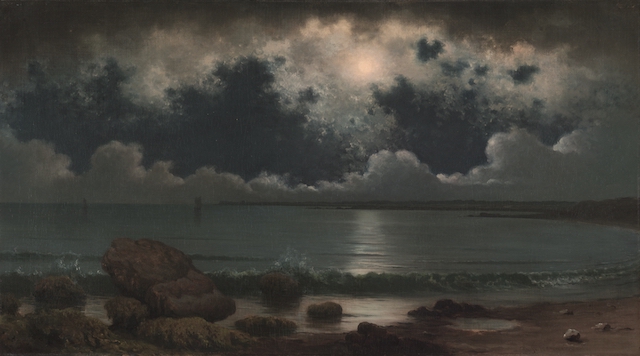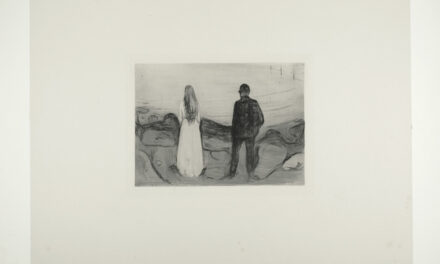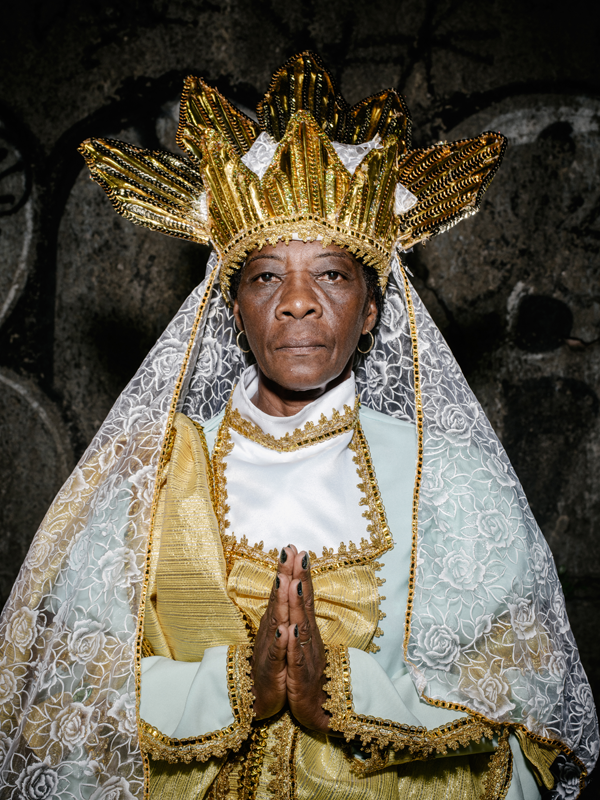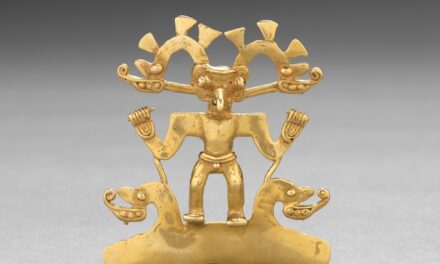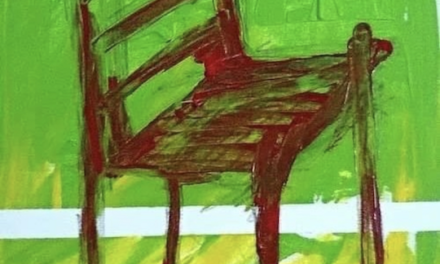Heade, Martin Johnson. Point Judith, Rhone Island. 1867-68, The Cleveland Museum of Art.
Lewis and Larissa
by Devin Murphy
The first spring night we passed over the border of the Hatteras Plain, the water was deep gunmetal blue and calm enough that we could see it sloping off the horizon. We’d been hitting on a five-mile shoal of King-Mackerel when Hollis came out on the decks and said, “We’ll set the nets out one more time,” and he tongued the gap where his canine tooth and bicuspid used to be. Spit in his mouth made a popping sound from the suction between the pock in his gums and his tongue.
The winter I turned eighteen, Hollis Callaghan had hired me to join him, Terry, and Cole to work the fishing season. It was going to be good money and I wanted an adventure that didn’t involve joining the Marines and being sent to Camp Lejeune ten miles from where I grew up. Hollis was always looking for young, cheap labor so Terry and Cole—who were nineteen and twenty, and had been with Hollis the year before— and I were all good fits. Terry was skinny, with lanky muscles that looked like tiny fists protruding from under his skin. Cole was stocky, with short cropped, kinky hair, and everything about him was casual and easy, his face slender, the ghost of a smile always about to crack loose. Hollis was stout and muscular with midnight black skin, long black dreadlocks that looked dusted in cinnamon, and a coiled obsidian beard that covered his whole jawline and neck. His high forehead and wide nose were pocked, and his lids draped over his copper coin eyes. Bunches of dark veins starting at his shoulders unfurled as they ran down to his hands.
After a winter of setting and hauling the nets, I’d gotten to a point where I wasn’t slowing the others down anymore. We worked the long hours like a silently plodding unit, each of us rotating between happy with our work and a growing meanness over how hard it was. My knees were sore from working on the pitching deck, picking cod, herring, monkfish, hake, pollock, salmon, and an occasional squid from the gillnets and tossing them down a chute to Cole and Terry, who would slice them up and toss the entrails over the side to the seagulls.
We stayed close enough to the shore that we could slip into Wanchese, Beaufort, or Charleston to unload our catch, but with the start of spring, we went further out. Lighthouse Lady was one of the largest trawlers still allowed in the southern Atlantic fishing grounds off North Carolina. It was a custom-built, 127-foot, steel-beam trawler, with a high-whaleback bow, and slow-turning, high-torque engines to power it through rough waters.
That spring night though, there was a veiled blue twilight when we set the nets out again, and when we had them run out and trailing behind Lady, we went below decks for a late chili dinner cooked by Cole and Hollis, who argued about what seasoning to add.
“Dip those dreads in here for some flavor, if you want,” Cole teased.
“You boys couldn’t handle it so spicy,” Hollis said back in a familiar, sort-of loving way that made me a bit jealous.
Later that night, Hollis woke us because the wind had changed over the course of a half hour from the southwest to the northeast. When we went back out on the decks, the waves had darkened and were tossing the ship around. Twenty-foot swells crested over the thigh-high railings onto us. We needed to haul in the net so we could make our way back to shore. The work was taking too long because the crisscrossed currents were dragging the nets away from us. The wind peeled the crest off each wave and filled the air with saltwater.
“Stop!” I heard Cole yelling from the side of the net spool. He paused out of fear, then waved his arms over his head. I switched the crank off because I couldn’t hear over the cavitations of the props trying to steady us. Cole was in the middle of an inaudible scream when the starboard side of Lady lifted damn near skyward, and a giant wave folded itself over our deck.
My grip on the crank’s lever was yanked loose when the wall of water swept me head first and slammed me against the gunwale. My whole body was locked between the ship’s metal and the freezing water until I felt Lady trying to right herself, which created an eddy on the deck that lifted me up and spit me over the side.
An icy blackness swallowed me.
I reached for anything solid while being lifted higher into the darkness on the shoulder of a wave. Then Cole was swimming next to me. The hood of his float coat was popped over his head and made him look like a glossy turtle. Then he lifted his face to me and I saw the wide, black pit of his mouth and giant, black-cored, white eyes, flared by panic. He grabbed me. His arm wrapped around my chest. I didn’t know if he was clutching me out of terror and dragging me down or trying to pull me up. I snapped my head forward and slammed it into the bridge of his nose. Then his grip loosened, and the thick rubber material of his sleeve slipped over my cheek, and I was alone and lost in the cold water again.
I’m not sure how long I fought to stay above the surface before something hooked the hood of my float coat. As a wave dropped out below me, I swung free and hit the rusty maroon side of Lady, clawing into it with my fingertips, trying to climb out of the endless salty dark. The next wave lifted me up the ship’s side, and the hook on my coat and a hand on my shoulder pulled me over the gunwale. I scuttled over in a cold terror and clutched a cable running from the starboard bow to the wheelhouse with my bloodied hands.
“I got you,” Terry yelled. He tossed the gaff hook onto the flooded deck and pinned himself against me and the cable to brace for the next wave.
That next wave lifted Lady, and I saw Hollis get tossed against the far bulkhead of the wheelhouse. When he stood up, he turned the spotlight on and cranked it so the bright light shone in my face. Then he swept the light over the decks looking for Cole. The wide light beam looked like an empty ghost blanketing the foredeck. I wrapped my arms tighter around the cable and squeezed my cheek against it. The light shone over us again. The sound of the diesel engines pumping the props through the wind and rolling white caps shook the whole ship.
Hollis opened the cockpit door with what looked like a bright orange length of PVC pipe that he aimed at the sky and pulled a string out of the base. The tube shot bright red flares into the dark sky off the port side of the ship like a Roman candle. The red nitrate flames traced a line away from our ship before arching down and hitting the water, glowing on the distant surface before disappearing in the furrows of the waves. Each flare left a smoky red wake in the wet sky.
Then a small rectangular gleam of light reflected back at us on one of Hollis’s sweeps of the spotlight. The hood of a jacket.
I opened my mouth to yell at Terry but couldn’t catch my breath to say anything, and the light dropped behind a swell. I tried to point, but neither of my panicked hands would unlatch from the cable.
“Do you see Cole?” Terry was yelling with his back pinned to mine. Another wave hit us, and we spun around in a circle away from the last traces of the flares. When Hollis shined his light off the port side again, I watched it sweep over the turgid, dark water but saw nothing.
“Do.You.See. Him,” Terry screamed in my ear, and I knew that was what Hollis was thinking above us as he cranked the diminutive light beam back and forth. But I was still too scared to even point toward that shimmer of light.
Terry pulled me by the back of my jacket to get me to let go of the cable and dragged me to the ladderway. He braced his shoulders against my back and pushed me up the stairs, making the lift of his legs and arms move mine. At the top, he forced the wheelhouse door open and pushed me inside, where I fell against the bench.
“Is he OK?” Hollis yelled.
“I don’t know.”
“Check the stern,”
Terry shut the door and went back on deck.
“Lew! Lew! Lewis!” Hollis was yelling at me. The lift and drop of the ship surged against my body. “Get up, and help me look. Look!” Hollis grabbed me by the hood and pushed me against the wheelhouse windows. He held the Gibson Girl, the small portable radio used on lifeboats when you have to abandon ship, and I knew some part of him must have been scared Lady was going down. I clutched at his shoulders and pulled his face to mine. I tried to tell him I had headbutted Cole.
“Do you see him?” he yelled, pushing me away.
I caught myself on the console but had no idea what direction we were facing and could no longer make out anything reflecting in the darkness.
Hollis was hailing the coast guard on the radio. “Pan-pan. Pan-pan. Pan-pan. Mayday. Mayday. Mayday.” I turned to him, but my weight shifted, the blood drained out of the top half of my body, and I crashed onto the deck.
The coast guard sent a chopper from Norfolk. Hollis plotted a search track to do expanding circles from the exact location the wave hit us. He coordinated with other ships coming to help, and they searched through the night, even though the water was too cold for anyone to last much longer than forty minutes. From the deck, I heard what must have been Hollis, Terry, and the radio, but in my panic mistook it for a voice under the ship calling out to me.
I remained on the wheelhouse deck until Terry pumped out the flooded bilge, and we were forced to turn back to shore to refuel.
“Cole?” was all I could get out.
“You got a good concussion,” Hollis said and pushed on my chest, so I’d lie back down.
My stomach dropped thinking of Cole in the cold water, and at that moment, I wanted the boat to sink.
Out the windows, the sun was like a great rolling cat’s eye. I stood up. Ahead of us, the waves crested and crashed into each other, and beyond that was the thin strip of shoreline. Between us and the shore, a garbage barge worked its way north from Wilmington. I couldn’t help but think of how I needed to purge that glimmer of light I’d seen and the reason there was an egg-sized lump on my forehead.
As soon as the lines were tied off, the coast guard officers took me to New Hanover Medical Center, where a doctor diagnosed me with a grade-two concussion and gave me a room to rest in. In the room, two coasties asked me questions about what had happened. When they finished, they told me they’d asked Hollis and Terry the same things to see if our stories corroborated. They were satisfied by each of our descriptions of Lady being engulfed by a wave.
When the two of them left the room, Hollis walked in. Backlit by the hallway he looked like a Rastafarian shadow.
“Did they find him?” I asked.
“I’ve got my phone for them to call me,” Hollis said. “They’re still looking.”
Hollis sat by the window, twisting and untangling his dreadlocks.
Neither of us spoke.
I spent the rest of the night staring at the hospital room’s spackled ceiling, globs of glue along the seam where the wall molding and floor tiles met, and looking at the thin translucent tubes dangling from the IV rack.
Hollis’s phone rang late that night. “Yes. OK. Yes,” he said. His phone snapped shut. He shook his head.
“They’re done searching.”
He stood up and walked to me.
“Hollis,” I said. When he turned, I saw how full of sadness he was, and I unhinged my jaw to swallow what I needed to confess.
When I was released from the hospital the next morning, I took a bus up to Beaufort, where Hollis had tied up Lady. For the next week, Terry and I slept on board. Both of us were sort of stunned. We didn’t know what to do next and didn’t want to go back to our homes without jobs. Lady’s steel side rubbed against the rubber docking buoys, and the slow groan of the mooring lines stretched with the tides. Close to sleep, my imagination wandered through the little rooms in the haul of the ship—searching for some residue of its lost crew member. I wanted to find Cole’s voice lodged where the stairwell and overhead jammed together.
The Lady was still in the harbor during the memorial service for Cole a week later. A local Baptist minister and Hollis stood in front of a small crowd of fisherman and members of Cole’s family to wish the lost man his final farewell. I stood among the crowd in the cleared parking lot overlooking the wharf. Lady was the largest ship there. The bow was painted a deep maroon that masked some of the rust and exposed steel flakes, which remained embedded in my fingertips from trying to climb up the boat’s side. The wheelhouse had a fresh coat of white paint on it that made it look misplaced on the superstructure. Seagulls perched on the radar antennae of the docked boats. The halyards smacked the main beams and made a metal clanking sound with the subtle rocking of the water in the harbor. Past the boats in the harbor was the channel back to the open ocean.
When the service was over, people gathered around a food and drink table set up against the harbor master’s office. I went to Lady and pulled all the foul-weather gear from the lockers and looked at the back of all the hoods, where the rectangular reflection decals were. Seeing the decals on all the jackets confirmed that what I had seen in the water was Cole, facedown, drifting away. I thumbed the sharp corners of the reflector on one of the jackets and rubbed the stiff rubber sleeve over my cheek. The jacket was still in my hand as I went back to the service.
I waited for Hollis to leave the group of people who had surrounded him around a beer cooler. When he walked away, I caught up to him.
I held the jacket in my hands so the decal was facing him.
“I couldn’t say it on the boat,” I began.
“It’s OK, Lewis. I understand. That would have shaken anyone.”
“No.”
“You don’t have to worry about it. It’s not for everyone.” He was trying to save me some pain by anticipating what I was going to say. “Maybe I can get you a job with the harbor master, and you won’t have to go out again.”
When he said that, I knew he was right, that I was terrified of going back to sea, where whatever monster waves were cruising over the ocean could find me again.
Hollis started to walk away, but I grabbed his arm. He looked at the jacket decal I held in front of him, then glanced over my shoulder.
A middle-aged woman with a girl in her late teens walked up to us. They both wore black dresses and had the same copper skin. The woman had straight hair dyed fruit punch red, and the girl had long, silky, black hair coiled up by a curling wand.
“This is Cole’s mother and sister,” Hollis said. He hugged the mother. When he tried to hug the sister, she stepped back from him.
“Can we talk?” the mother asked him, and Hollis put an arm around her and walked away. Cole’s sister followed.
Hollis kept Lady moored in port for a week after the service, while he hired two more crew members to join him and Terry. He got the harbor master to take me on, loading and unloading crabbing pots, net spools, trash, and keeping the dock schedule of boats coming in and out of the slips for potable water, fuel, and supplies. The job came with a one-bedroom coach house a mile from the harbor.
After working at the harbor a few weeks, I saw Cole’s sister leaning against the wooden rails on the docks, her bike resting on its kickstand behind her. She wore Capri jeans, a light blue sweater, and her hair was pulled into a ponytail as tight as water. I hadn’t noticed at the service, but with the morning light on her, she looked like Cole—same black eyes, wide nose, and thick, plum-colored lips. I had looked right into her brothers’ face during his last waking moment. The image sat next to me day and night. I turned back to the office—I didn’t want to know why she was looking out at the water.
Hollis had paid for new licenses and gone up to the Georgia Shelf in the north Atlantic and was probably unloading his catches outside of Portland or Halifax. I got used to working on the docks, and it wasn’t until late May when I was checking the oil level of the harbor’s outboard motorboat that I saw Cole’s sister again.
“Hey, Lewis,” she said, looking into the skiff. Her dark slacks and button-down shirt had a restaurant insignia on them. “I’m Larissa, Cole Washington’s sister. We met at the service.”
“I remember,” I said.
“Have you seen Hollis around?” she asked.
“Not for about a month.”
“Is he afraid to come back to the port?”
“I wouldn’t know.” I climbed out of the skiff onto the dock. The boards creaked beneath my feet, and a nickel-sized wharf spider climbed up from between the cracks and disappeared between two other planks.
“There aren’t many ships here now,” Larissa said. “Can I give you my number to call when Hollis gets back?”
She took out a waitress notepad from her back pocket and wrote her name and number on it as she followed me back to the office. I went inside and stood back from the window, so she wouldn’t see me watching her bike away.
Larissa stopped by again several days later. She wore the same uniform and a blue raincoat with a thin white reflector line down each shoulder. She saw me and waved before I could duck into the office.
“I brought you something,” she said, getting off of her bike and swinging a backpack around so it rested on the crossbar. “I’m not sure if you’ll like it, but sometimes I can get a free meal from work.” She handed me a Styrofoam container with seafood lasagna inside. We went into the empty harbor office.
“Have you seen Hollis yet?” she asked.
“He hasn’t been in,” I told her. “Don’t you have school or something today?”
“No. I work at Rosalina’s across town.”
I started to eat in front of her.
“I can scrounge up some more of that almost anytime. Give me your phone number, and I’ll call you when I’ve got lunch or dinner on the way.”
I studied her skin, the copper brown of a pretzel, the high arch of her eye sockets, her cheekbones, which capped off at her rounded chin, and how everything about her had the look of a local shrimper’s daughter from the Intracoastal Waterway. She gave off a sense that the ocean would precede and follow her everywhere she went.
My phone rang late that night.
“Lewis,” Larissa cried. “I need your help!”
I found her sitting on a bench in the harbor parking lot. She had on her blue jacket, and the thin reflector stripes on her sleeves were glowing under the streetlight. The front tire of her bike had buckled in and was bent like a taco, and her uniform pants were sheared off at her skinned and bleeding knees.
“I wanted to see if Lighthouse Lady had come back.”
A coolness seeped down from the bridge of my skull as I imagined she was about to say something about waiting for Cole. I realized I had cursed strangers to living with ghosts as well.
I helped her up, and we walked to the office. There was an industrial first aid kit mounted on the wall that I’d used to fish rust from Lady’s side out of my fingertips. I sat her down on the small couch and tried rolling up her pant legs to get a look at her knees. She stood up in front of me, dropped her pants to the floor, stepped out of them, and sat back down. I stared at her smooth brown legs and blue-patterned underwear that wrapped between her thighs in a fleshy V. I’d never been that close to a girl in her underwear before and was overwhelmed with a dizzying want for her and had to shut my eyes.
“Will your mother be able to help?” I asked Larissa.
“She won’t even notice I’m gone,” she said.
I unpacked the first aid kit and laid it on the floor next to where she was sitting. “What happened?”
“I biked from work and crashed on the gravel.”
She reached down and put her hands on my shoulders when I poured iodine over her cuts and tweezed the gravel out of her skin. It felt like the first time someone had touched me my whole life.
“What were you doing here at night?”
“I come here a lot,” she said.
I looked from her blue underwear back to the gravel in her knee.
“I’m trying to understand why Cole did this kind of work.”
I cleaned and wrapped her cuts. My hand cupped the curve of her calf. My fingertips memorized the feel of her skin.
I used the harbor master’s truck to drive her home and took her bike to my house, where I fixed the derailleur and straightened her tire using vice-grip pliers. The next evening, when she walked to my house to pick up her bike, she brought another Styrofoam dish of seafood pasta. While I ate it, she pulled up her pant leg to show me the new bandage. There were brown iodine stains on her skin.
“When do you think Hollis will come back?” she asked.
“I don’t know,” I said, wondering if she was in love with him. “Why do you want to see him so bad?”
She pulled her pant leg down over her knee and started walking around my kitchen. “My mom and him were on and off again for years. The day of Cole’s service, I heard him and my mom in her room doing it. Like, only hours after the service. He’d been coming in and out for years doing that, but that night, I wanted to shoot him dead. Her, too.” She opened the empty refrigerator and shut the door. “You know, he got Cole going out to sea.”
Hollis must have gone to Larissa’s house after Cole died, must have thought he was helping her mother mourn by letting her feel like an animal and not human and heartsick.
“I’ve been going down to the harbor and watching all those boats coming and going. I can see why Cole would have done that, but I can’t really understand how Hollis could have let him disappear.”
Larissa put her hands on her head and sat on the couch. “Where’s my brother, Lewis?”
I sat next to her. Tell her. Tell her. I needed to tell someone what happened. I needed to tell her what happened. I was getting the words straight when she leaned in and buried her face in my shoulder. After a while, we laid down together with her sobbing into my shirt.
“What’s it like in the water?” she asked, and the feeling of never touching anything solid came flooding back. I tried to get off the couch, but when I moved my leg, hers clamped tighter around my thigh. She buried her head into my chest, and I could feel her grinding herself against me until we drove ourselves deeper into the couch. My hands splayed out over her hip bones and she ran her fingertip under the elastic of my boxers before thumbing them down to the back of my knees.
In the morning, I cleaned Larissa’s cut, which glistened under my kitchen light with splotches of blood against a swath of gooey pink. That night, it had scabbed over, but the scab was wet and mucus colored from the Neosporin. The next night when she came over, there was a thin membrane, damp and white like the skin of a larva. Night after night, I watched the scab form, seeing where it broke when she bent it walking and how it sealed itself again. Each night, we slept on my couch with her talking us to sleep, avoiding the bed, as if it meant something more daunting and complicated. When she touched me, Larissa’s left hand was a merciful presence—her right, a nameless and sudden grief.
“Can you come tell my mother what happened? She’s not facing it. I’m at least trying to understand how it happened. She hides away and does nothing.”
I kissed the top of her head and told her I’d tell her mother everything.
She took me to her house the next night. As we walked up to the front of the bungalow, the door opened, and Hollis walked out. He eased the door shut behind him, and when he turned, he saw us.
“Hey,” he said with the popping sound at the end of his words. “Your mom’s sleeping, Larissa.” His face was flushed above his beard and sweat rimmed along his brow.
“Jesus,” Larissa said. “You must have run right over here before the engines turned off, and now you’re going to run off to some other port to get laid.”
“Whoa, now,” Hollis said. “You two know each other?” He walked down the porch to us and raised his left hand up and cupped the back of my neck. “That’s good.”
Larissa reached her hand over and grabbed mine. Hollis saw this.
“I want to know what happened to Cole,” Larissa said. “You have to go tell my mom that you took Cole out and lost him. Tell her that you lost him!”
“You’re right,” Hollis said. “Cole being lost was my fault.”
He spoke the words I’d wanted to say.
Hollis reached out and hugged Larissa. “I’m sorry. I didn’t find him.”
“Why didn’t you find him?” Larissa yelled. Her clenched fists swatted at the small of his back. Hollis squeezed her tighter, as if smothering her sadness. I backed away from them and started to walk, then ran to my place as fast as I could. As I ran, the blood pumped in my fingertips against the last shavings of maroon rust from Lady under my skin. It was getting dark outside, and despite all the houses with their porch lights and lit windows, I felt like I was lost in an un-solid world again, like the world and I were moving in different directions, separated by crosscurrents, soon to be strangers.
Larissa walked in and found me on the floor.
“What’s wrong with you?” she said, sitting next to me, favoring her cut-up knee. She leaned her hands on my chest so her wall of coiled hair fell over my face. “Tell me what’s wrong.”
“What happened?” she asked. “Why are you acting like this?”
There weren’t words to tell her what I’d done in the water. If I told her what I’d seen, it would bind me to her, this place, and this feeling forever, and I wanted to be far, far away from any sense of responsibility for others—drifting off on the currents, arm and arm with Cole.
Devin Murphy’s recent fiction appears in The Chicago Tribune, Glimmer Train, The Michigan Quarterly Review, The Missouri Review, and Shenandoah as well as many other literary journals and anthologies. He is an Assistant Professor of Creative Writing at Bradley University.

